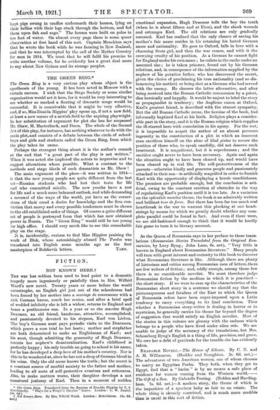THE GREEN RING.* The Green Ring is a very curious
play whose object is the apotheosis of the young. It has been acted in Moscow with a certain success. I wish that the Stage Society or some similar organization would act it here, for it would be very interesting to see whether so marked a flouting of dramatic usage would be successful. It is conceivable that it might be • very effective, and, if so, Miss Zinaida Hippius' play opens up, if not a new field, at least a new corner of a newish field to the aspiring playwright. In her substitution of argument for plot she has far surpassed Mr. Shaw, M. Maeterlinck, and Ibsen. The whole of the Second Act of this play, for instance, has nothing whatever to do with the main plot, and consists of a debate between the circle of school- boys and girls and students called the Green Ring, from which the play takes its name.
Perhaps the strangest thing about it is the author's remark at the end that " a great part of the play is not written." When it was acted she implored the actors to improvise and to suggest alterations where possible. What a contrast to the methods and stage ideals of such dramatists as Mr. Shaw !
The main argument of the piece—it was written in 1914— is that the new young people are quite different from the last set—Russian students who had lost their taste for life and who committed suicide. The new youths have a zest for life and a much more balanced outlook, and while demanding a reversal of the ways of the world, yet have as the corner- stone of their creed a desire for knowledge and the firm con- viction that mercy and every possible tenderness must be shown to the old established order of things. Of course a quite different set of people is portrayed from that which has now obtained power in Russia. The " Green Ring " would still be too young for high office. I should very much like to see this remarkable play on the stage.
It is, incidentally, curious to find Miss Hippius praising the work of Blok, whose astonishingly absurd The Twelve was translated into English some months ago as the first masterpiece of Bolshevik letters. Tans.


































 Previous page
Previous page